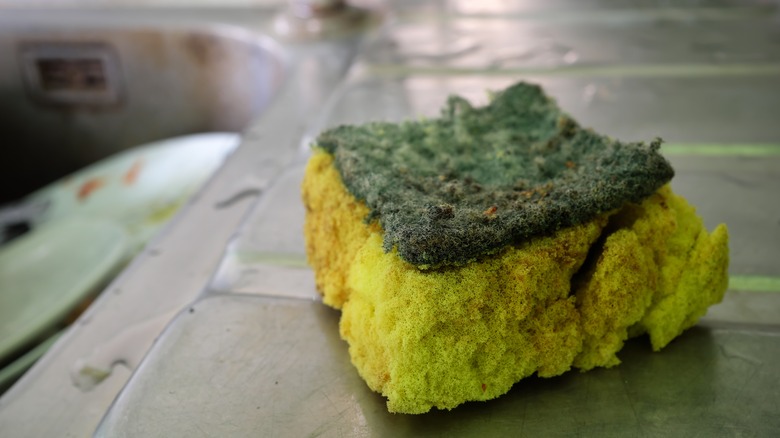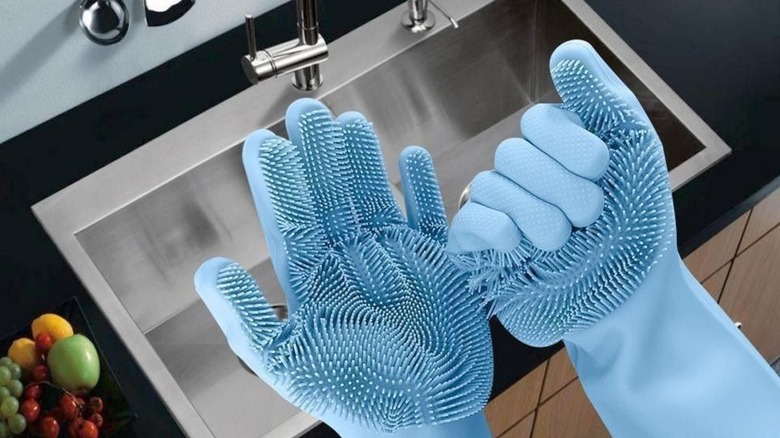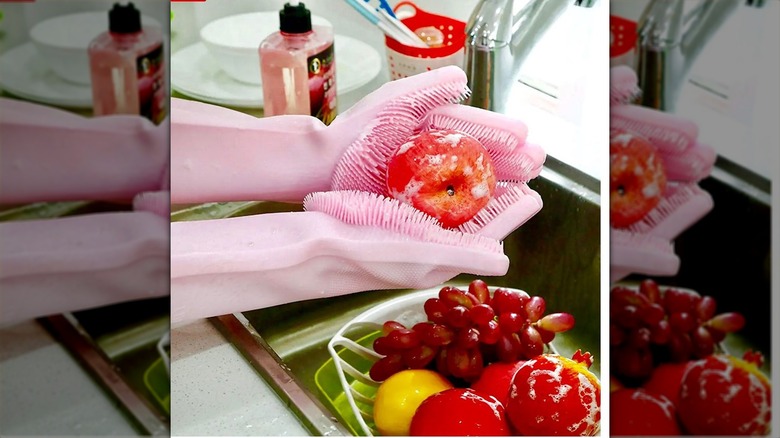The Silicone Dish Gloves That Will Have You Ditching Your Stinky Kitchen Sponge
You know all about rubbing alcohol, the secret ingredient to bring your sponges back to life, but the truth is your kitchen scrubber still makes you cringe. And if you've ever caught a whiff of an unpleasant odor while washing dishes or wondered if your porous friend really is cleaning as well as it should, you're not alone. A 2017 Scientific Reports study highlighted that these swabs are more than just a bit germy — they can harbor up to 362 types of bacteria, including some pretty nasty pathogens like Salmonella and E. coli. In fact, the study showed how the porous, moisture-retentive structure of sponges creates the perfect environment for bacteria to thrive. These same properties help them absorb food particles and moisture, which can lead to a buildup of unpleasant smells. Short of using a new kitchen sponge every time you scrub your dishes, there is a realistic solution for this hygiene headache — silicone dish gloves, which may just become your new best friend in the kitchen.
These gloves offer a hygienic alternative to sponges because they don't absorb any odors or bacteria. They're heavy-duty, handle heat well, and don't need to be replaced as often as traditional swabs. In addition to keeping your kitchen cleaner, they also ensure you're not handling potentially harmful bacteria when you wash your dishes. Yes, it might be time to throw out that kitchen sponge and move on to cleaner pastures.
All hail the silicone scrubbing gloves
Silicone dish gloves are truly a game-changer for kitchen cleanliness. One of the major perks of these products is their non-porous surface, unlike the fibers of traditional swabs and scourers. Silicone doesn't absorb moisture or food particles, significantly reducing the risk of bacterial growth. These gloves also don't develop that funky smell that sponges do. And if you use them to clean a particularly nasty spill, they're incredibly easy to clean — just pop them in the dishwasher or wipe them with hot soapy water.
Sometimes when you're in the swing of washing the dishes, you don't want to take your gloves on and off while completing other kitchen tasks. Not only are silicone gloves highly resistant to heat (so you can quickly take out that batch of cookies), but you can also use them with mild cleaning chemicals to wash other surfaces. You can safely use them with hot water or handle warm dishes without worrying about melting or warping. For the best results, keep at least two pairs of silicone gloves. While one pair is in use, the other can dry completely, ensuring that moisture doesn't lead to bacterial growth. This routine helps maintain their longevity, saving you money and reducing waste over time.
All the ways to use your dish gloves
Silicone dish gloves offer more than just a cleaner and safer alternative to sponges — they bring a range of benefits that make them a practical addition to your kitchen. For instance, their built-in scrubbing textures make dishwashing more efficient, helping you tackle stubborn grime with ease. They also don't scratch surfaces, so they're a great solution for non-stick cookware and plastic items.
Beyond scrubbing up after dinner, silicone gloves are great for other household tasks. Use them to scrub vegetables, wipe down countertops, or even clean the bathroom. They're also handy when it comes to taking care of your furbabies, so you can wash your dog or couch of pet hair with a swipe or two. The gloves' inherent flexibility and durability make them versatile tools for various chores — just be sure to color-code them for their different purposes.
Environmentally speaking, silicone gloves are a smarter choice than disposable sponges. Since they're durable and reusable, they're more cost-efficient than their spongy counterparts. You're also cutting back on additional tools because they're so versatile. With their resistance to odors, ease of cleaning, and multi-purpose functionality, silicone dish gloves are an investment that benefits both your kitchen and the environment. Now what to do with that old stinky sponge? Reuse it as a handle for your garden tools or as makeshift kneepads — your hands and knees will thank you.


